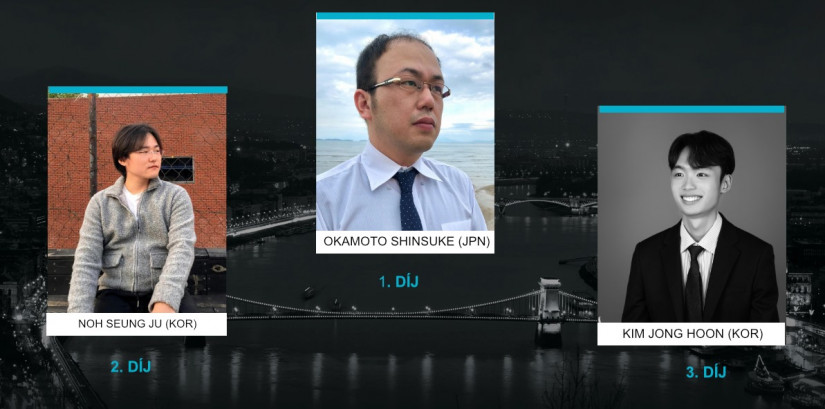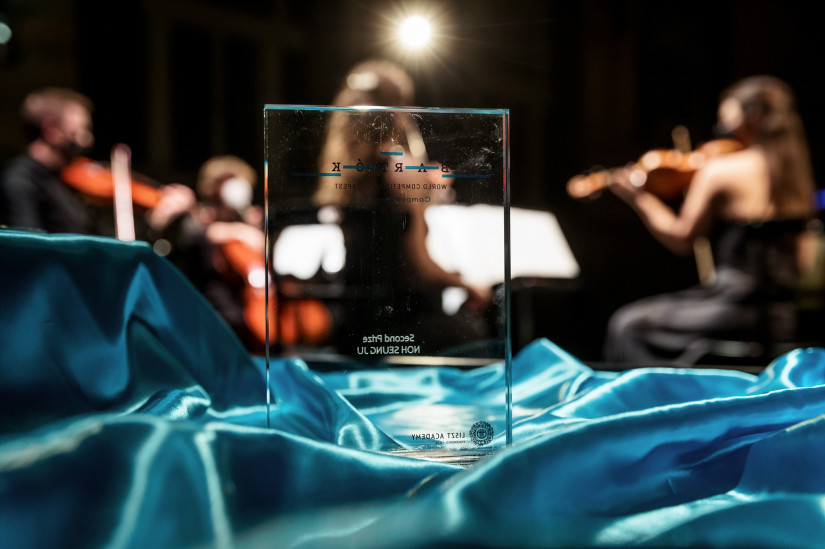Spectators from 32 countries watched the live online broadcast of this year's awards gala of the Bartók World Competition. Due to the pandemic, the event was organised behind closed doors without an audience or the winners being present; the programme included the award-winning compositions as well, which were performed by the Accord, Korossy and Kökény Quartets. In this year’s competition composers were invited to submit works written for string quartet, and the event’s international reputation is well illustrated by the fact that 348 compositions were received from 59 countries.
The prestigious international jury decided to award the first prize and the EUR 5,000 reward to the young Japanese composer for his work entitled Calligraphy for Air and Ground. Okamoto Sinzuke also won the award granted by the event’s collaborating partner, UMP Editio Musica Budapest, and his composition will be among the optional pieces of next year's Bartók World Competition semi-finals.

The second prize, which came with a EUR 3,000 reward, went to South Korean composer Noh Seung Ju for his work entitled Caveman, while South Korea’s Kim Jonghoon came in third with his piece called Papel (Babel) and received EUR 2,000.
Apor Szüts (Morsmordre - Toccata “quasi una Fantasia”), Jose Gonzalez Granero (String Quartet No. 2 - “In times of confinement”) and Adam Brandenburg (Distances) received the jury’s honourable mentions. The latter was awarded the other special prize granted by Editio Musica Budapest, thus his composition will also be included in the repertoire of next year's Bartók World Competition.

In her speech, president of the Liszt Academy Dr. Andrea Vigh highlighted the fact that the large number of applications proves that the composer’s round of the Bartók World Competiton has now reached adulthood. “Young composers keep count of this competition, prepare for it, and we can be proud of this. We have received many excellent works, there was a wealth of pieces for the prestigious international jury to choose from,” she added.
Péter Eötvös, chairperson of the jury and world-famous composer awarded the Order of St. Stephen of Hungary, noted that it was a bold initiative to have young composers write pieces for string quartet. "Composing a good piece for string quartet is the most delicate task, because the science of chamber music is concentrated in this genre," Eötvös stressed. He added that the international jury weighed principles such as the professional standard of the given composition and the author’s pursuit to convey the completeness of the string quartet sound. The jury considered it a particularly important aspect that the applicant's work provides an opportunity for the string artists of music universities to promote the development and coherence of young quartets.
In addition to Eötvös, the other members of the prestigious panel included Unsuk Chin, South Korean composer living in Germany; Israeli-American composer Chaya Czernowin, professor at Harvard University; Johannes Meissl, Austrian violinist, chamber musician and professor, one of the artistic directors of the European Chamber Music Academy and vice-rector of the Vienna University of Music; as well as Gyula Fekete, Deputy Rector of the Liszt Academy and head of the Composition Department.
Well-known lecturers and renowned composers of the Liszt Ferenc University of Music took part in the work of the preliminary jury, which selected the finalists in September. In addition to Deputy Rector, Head of Department and recipient of the the Erkel and Bartók-Pásztory Prizes Gyula Fekete, Máté Bella, also a recipient of the Erkel and Bartók – Pásztory Prizes, Zsolt Serei, winner of the Erkel Prize, Péter Tornyai, Junior Prima Prize winner as well as Kossuth Prize winner János Vajda were the other members of the panel.
After proclaiming the winners, Dr. Andrea Vigh publicly announced next year’s round of the Bartók World Competition for string quartet ensembles. Applications for the 2021 contest can be submitted on the bartokworldcompetiton.hu portal from December 15.
If you want to read more about Liszt Academy, visit the official website of the university.
Sources: zeneakademia.hu